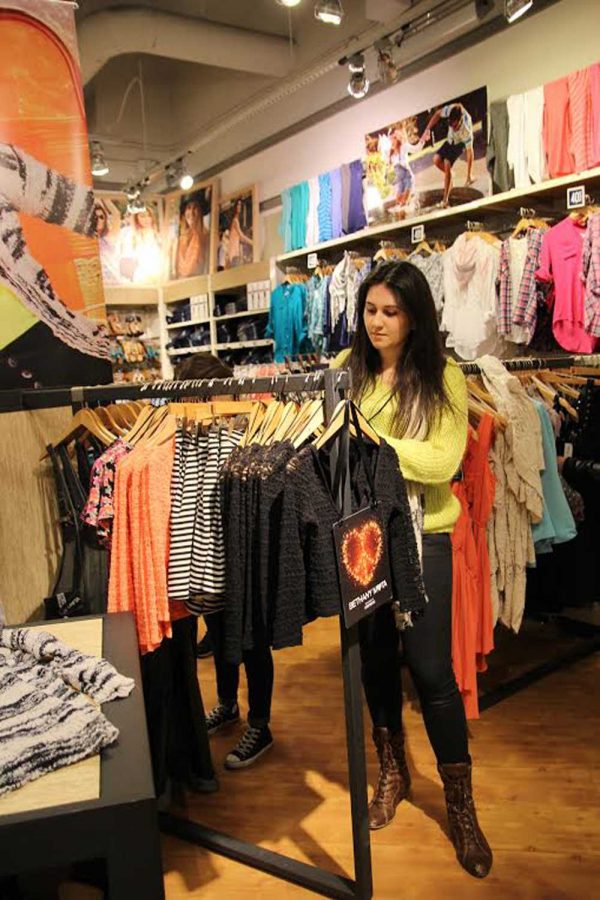Clark students take over Glendale retail stores
April 8, 2014
“Retail in general is really nasty,” said senior Nicco Mekerdichian. “Customers treat you like dirt and what’s worse is the way your employer treats you and expects you to not defend yourself or argue with a customer.” Mekerdichian has been working at Abercrombie for over two years now and has experienced many of the negative aspects of retail as well as the perks, such as employees receiving 30% off their clothes.
Mekerdichian, along with many other teens, is part of a retail market that has recently been improving. According to the Bureau of Labor Statistics, the number of employed youth 16 to 25 years old increased by 2.1 million to 19.7 million in 2013. During the months between April and July, large numbers of high school students search for summer jobs. It is reported that the month of July is typically the peak in youth employment. The share of young people employed in July of 2013 was 50.7 percent.
According to Randy Tiffany, work permits and school-to-career counselor, teens between the ages of 15 to 18 are required to obtain a work permit before starting any job. They, along with their employer and parents/guardians, must fill out this work permit. The work permit is then approved if the student maintains at least a 2.0 GPA with good attendance. Clark gives out about 50 to a 100 work permits per year. About 65 percent of them are for retail stores, Tiffany said.
Tiffany says most Clark students acquire work permits for retail stores. “I think what attracts teens the most in working in retail stores is the discounts they receive, the flexible working hours for part time, how easy the work is and the fact that they can easily make it a full time job after high school if they choose to,” he said. “It’s definitely a stepping stone.”
According to the Bureau of Labor Statistics, about 19 percent of employed teens work in retail trade. Juniors Ani Vardanyan and Stella Petrosyan are two of these teens, as both began working at Aeropostale in June 2013.
“It’s one of the main stores we knew was hiring teens at 16 years old, so we just applied there and got the job. We even became store ambassadors, meaning we are in charge of advertising for events,” Petrosyan said. Petrosyan says that what first attracted her to the job was her love for clothes and fashion. In the future, she wants to work with clothes and feels that working at Aéropostal has been a good start.
Petrosyan and Vardanyan have dealt with their share of struggles throughout their job. When asked what her biggest challenge is, Vardanyan said that time management has been the most challenging. “Sometimes you’ll have to do a good four or five different things at a time,” Vardanyan said. “The managers give you a certain task such as setting up an entire table with neatly folded and size categorized clothes within 20 minutes.”
Other challenges include miscommunication with customers, trouble with stock checks, inability to find a certain sizes and dealing with bulk buyers.
Despite the difficulties, working at Aeropostale has had a positive impact on Vardanyan and Petrosyan’s lives. “You learn to push and challenge yourself,” Petrosyan said. “Your coworkers are like your family. It’s a good experience because you get to interact with people and get out of your comfort zone. It opens you up.”
Their typical day begins with clocking in and then listening to a recording called “touch base,” which is a message from their manager that tells them about their goals and focuses on the promotions going on for the day. Then they check in with their manager and proceed to their designated area to begin their job. Their responsibilities range from working the cash register, greeting customers at the front and managing the fitting room or back of the store.
One of the top reasons teens choose to work at retail stores is because such establishments often hire people at a young age. Retail stores also give teens weekend shifts, which are convenient because of teens’ school schedules.
Mekerdichian decided to become involved in retail for different reasons than Vardanyan and Petrosyan. “I wanted sales experience for college because I want to major in business in the future,” he said. “Working in a retail store is considered sales experience and it enhances your application for college.”
Mekerdichian’s job has taught him several useful skills that one simply cannot learn in the classroom. “I started off very nervous and definitely not outgoing as much as I am now,” he said. “They require you to talk to the customer and make sure everything is okay so my social skills and my ability to go up and just talk to people have definitely improved.”
Mekerdichian is satisfied with his job for now but said that he looks forward to the future, hoping to use the skills he learned to advance in the business world.
